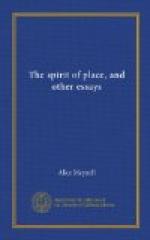A COUNTERCHANGE
“Il s’est trompe de defunte.” The writer of this phrase had his sense of that portly manner of French, and his burlesque is fine; but—the paradox must be risked—because he was French he was not able to possess all its grotesque mediocrity to the full; that is reserved for the English reader. The words are in the mouth of a widower who, approaching his wife’s tomb, perceives there another “monsieur.” “Monsieur,” again; the French reader is deprived of the value of this word, too, in its place; it says little or nothing to him, whereas the Englishman, who has no word of the precise bourgeois significance that it sometimes bears, but who must use one of two English words of different allusion—man or I gentleman—knows the exact value of its commonplace. The serious Parisian, then, sees “un autre monsieur;” as it proves anon, there had been a divorce in the history of the lady, but the later widower is not yet aware of this, and explains to himself the presence of “un monsieur” in his own place by that weighty phrase, “Il s’est trompe de defunte.”
The strange effect of a thing so charged with allusion and with national character is to cause an English reader to pity the mocking author who was debarred by his own language from possessing the whole of his own comedy. It is, in fact, by contrast with his English that an Englishman does possess it. Your official, your professional Parisian has a vocabulary of enormous, unrivalled mediocrity. When the novelist perceives this he does not perceive it all, because some of the words are the only words in use. Take an author at his serious moments, when he is not at all occupied with the comedy of phrases, and he now and then touches a word that has its burlesque by mere contrast with English. “L’Histoire d’un Crime,” of Victor Hugo, has so many of these touches as to be, by a kind of reflex action, a very school of English. The whole incident of the omnibus in that grave work has unconscious international comedy. The Deputies seated in the interior of the omnibus had been, it will be remembered, shut out of their Chamber by the perpetrator of the Coup d’Etat, but each had his official scarf.




